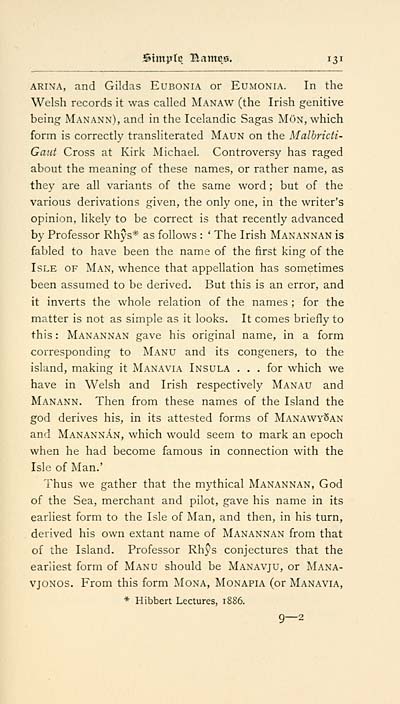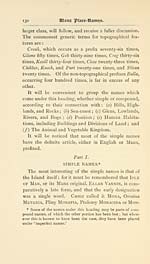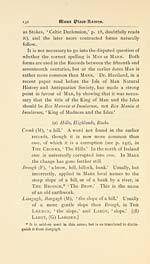Download files
Complete book:
Individual page:
Thumbnail gallery: Grid view | List view

Simpli^ Bam^a. 131
ARiNA, and Gildas Eubonia or Eumonia. In the
Welsh records it was called Manaw (the Irish genitive
being Manann), and in the Icelandic Sagas Mon, which
form is correctly transliterated Maun on the Malhricti-
Gnut Cross at Kirk Michael. Controversy has raged
about the meaning of these names, or rather name, as
they are all variants of the same word ; but of the
various derivations given, the only one, in the writer's
opinion, likely to be correct is that recently advanced
by Professor Rhys* as follows : * The Irish Manannan is
fabled to have been the name of the first king of the
Isle of Man, whence that appellation has sometimes
been assumed to be derived. But this is an error, and
it inverts the whole relation of the names ; for the
matter is not as simple as it looks. It comes briefly to
this : Manannan gave his original name, in a form
corresponding to Manu and its congeners, to the
island, making it Manavia Insula ... for which we
have in Welsh and Irish respectively Manau and
Manann. Then from these names of the Island the
god derives his, in its attested forms of ManawySan
and Manannan, which would seem to mark an epoch
when he had become famous in connection with the
Isle of Man.'
Thus we gather that the mythical Manannan, God
of the Sea, merchant and pilot, gave his name in its
earliest form to the Isle of Man, and then, in his turn,
derived his own extant name of Manannan from that
of the Island. Professor Rhys conjectures that the
earliest form of Manu should be Manavju, or Mana-
vjonos. From this form Mona, Monapia (or Manavia,
* Hibbert Lectures, 1886.
9—2
ARiNA, and Gildas Eubonia or Eumonia. In the
Welsh records it was called Manaw (the Irish genitive
being Manann), and in the Icelandic Sagas Mon, which
form is correctly transliterated Maun on the Malhricti-
Gnut Cross at Kirk Michael. Controversy has raged
about the meaning of these names, or rather name, as
they are all variants of the same word ; but of the
various derivations given, the only one, in the writer's
opinion, likely to be correct is that recently advanced
by Professor Rhys* as follows : * The Irish Manannan is
fabled to have been the name of the first king of the
Isle of Man, whence that appellation has sometimes
been assumed to be derived. But this is an error, and
it inverts the whole relation of the names ; for the
matter is not as simple as it looks. It comes briefly to
this : Manannan gave his original name, in a form
corresponding to Manu and its congeners, to the
island, making it Manavia Insula ... for which we
have in Welsh and Irish respectively Manau and
Manann. Then from these names of the Island the
god derives his, in its attested forms of ManawySan
and Manannan, which would seem to mark an epoch
when he had become famous in connection with the
Isle of Man.'
Thus we gather that the mythical Manannan, God
of the Sea, merchant and pilot, gave his name in its
earliest form to the Isle of Man, and then, in his turn,
derived his own extant name of Manannan from that
of the Island. Professor Rhys conjectures that the
earliest form of Manu should be Manavju, or Mana-
vjonos. From this form Mona, Monapia (or Manavia,
* Hibbert Lectures, 1886.
9—2
Set display mode to: Large image | Transcription
Images and transcriptions on this page, including medium image downloads, may be used under the Creative Commons Attribution 4.0 International Licence unless otherwise stated. ![]()
| Early Gaelic Book Collections > Blair Collection > Surnames & place-names of the Isle of Man > (149) |
|---|
| Permanent URL | https://digital.nls.uk/82101436 |
|---|
| Description | A selection of books from a collection of more than 500 titles, mostly on religious and literary topics. Also includes some material dealing with other Celtic languages and societies. Collection created towards the end of the 19th century by Lady Evelyn Stewart Murray. |
|---|
| Description | Selected items from five 'Special and Named Printed Collections'. Includes books in Gaelic and other Celtic languages, works about the Gaels, their languages, literature, culture and history. |
|---|

